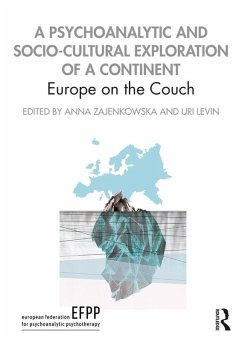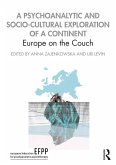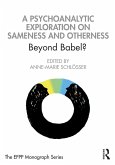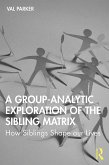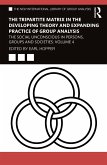A Psychoanalytic and Socio-Cultural Exploration of a Continent (eBook, PDF)
Europe on the Couch
Redaktion: Zajenkowska, Anna; Levin, Uri
39,95 €
39,95 €
inkl. MwSt.
Sofort per Download lieferbar

20 °P sammeln
39,95 €
Als Download kaufen

39,95 €
inkl. MwSt.
Sofort per Download lieferbar

20 °P sammeln
Jetzt verschenken
Alle Infos zum eBook verschenken
39,95 €
inkl. MwSt.
Sofort per Download lieferbar
Alle Infos zum eBook verschenken

20 °P sammeln
A Psychoanalytic and Socio-Cultural Exploration of a Continent (eBook, PDF)
Europe on the Couch
Redaktion: Zajenkowska, Anna; Levin, Uri
- Format: PDF
- Merkliste
- Auf die Merkliste
- Bewerten Bewerten
- Teilen
- Produkt teilen
- Produkterinnerung
- Produkterinnerung

Bitte loggen Sie sich zunächst in Ihr Kundenkonto ein oder registrieren Sie sich bei
bücher.de, um das eBook-Abo tolino select nutzen zu können.
Hier können Sie sich einloggen
Hier können Sie sich einloggen
Sie sind bereits eingeloggt. Klicken Sie auf 2. tolino select Abo, um fortzufahren.

Bitte loggen Sie sich zunächst in Ihr Kundenkonto ein oder registrieren Sie sich bei bücher.de, um das eBook-Abo tolino select nutzen zu können.
This important book gathers a set of influential international contributors with psychoanalytic and group analytic knowledge to provide a wide-ranging critical analysis of the present state of Europe.
- Geräte: PC
- mit Kopierschutz
- eBook Hilfe
Andere Kunden interessierten sich auch für
![A Psychoanalytic and Socio-Cultural Exploration of a Continent (eBook, ePUB) A Psychoanalytic and Socio-Cultural Exploration of a Continent (eBook, ePUB)]() A Psychoanalytic and Socio-Cultural Exploration of a Continent (eBook, ePUB)39,95 €
A Psychoanalytic and Socio-Cultural Exploration of a Continent (eBook, ePUB)39,95 €![A Psychoanalytic Exploration of Social Trauma (eBook, PDF) A Psychoanalytic Exploration of Social Trauma (eBook, PDF)]() A Psychoanalytic Exploration of Social Trauma (eBook, PDF)31,95 €
A Psychoanalytic Exploration of Social Trauma (eBook, PDF)31,95 €![A Psychoanalytic Exploration On Sameness and Otherness (eBook, PDF) A Psychoanalytic Exploration On Sameness and Otherness (eBook, PDF)]() A Psychoanalytic Exploration On Sameness and Otherness (eBook, PDF)33,95 €
A Psychoanalytic Exploration On Sameness and Otherness (eBook, PDF)33,95 €![A Group-Analytic Exploration of the Sibling Matrix (eBook, PDF) A Group-Analytic Exploration of the Sibling Matrix (eBook, PDF)]() Val ParkerA Group-Analytic Exploration of the Sibling Matrix (eBook, PDF)31,95 €
Val ParkerA Group-Analytic Exploration of the Sibling Matrix (eBook, PDF)31,95 €![Psychoanalytic and Socio-Cultural Perspectives on Women in India (eBook, PDF) Psychoanalytic and Socio-Cultural Perspectives on Women in India (eBook, PDF)]() Psychoanalytic and Socio-Cultural Perspectives on Women in India (eBook, PDF)33,95 €
Psychoanalytic and Socio-Cultural Perspectives on Women in India (eBook, PDF)33,95 €![Psychic Retreats (eBook, PDF) Psychic Retreats (eBook, PDF)]() John SteinerPsychic Retreats (eBook, PDF)42,95 €
John SteinerPsychic Retreats (eBook, PDF)42,95 €![The Tripartite Matrix in the Developing Theory and Expanding Practice of Group Analysis (eBook, PDF) The Tripartite Matrix in the Developing Theory and Expanding Practice of Group Analysis (eBook, PDF)]() The Tripartite Matrix in the Developing Theory and Expanding Practice of Group Analysis (eBook, PDF)33,95 €
The Tripartite Matrix in the Developing Theory and Expanding Practice of Group Analysis (eBook, PDF)33,95 €-
-
-
This important book gathers a set of influential international contributors with psychoanalytic and group analytic knowledge to provide a wide-ranging critical analysis of the present state of Europe.
Dieser Download kann aus rechtlichen Gründen nur mit Rechnungsadresse in A, B, BG, CY, CZ, D, DK, EW, E, FIN, F, GR, HR, H, IRL, I, LT, L, LR, M, NL, PL, P, R, S, SLO, SK ausgeliefert werden.
Produktdetails
- Produktdetails
- Verlag: Taylor & Francis eBooks
- Seitenzahl: 226
- Erscheinungstermin: 11. Oktober 2019
- Englisch
- ISBN-13: 9780429595493
- Artikelnr.: 57905676
- Verlag: Taylor & Francis eBooks
- Seitenzahl: 226
- Erscheinungstermin: 11. Oktober 2019
- Englisch
- ISBN-13: 9780429595493
- Artikelnr.: 57905676
- Herstellerkennzeichnung Die Herstellerinformationen sind derzeit nicht verfügbar.
Anna Zajenkowska, PhD, is Adjunct Professor and manages the Department of Social Psychology and Doctoral School of the Maria Grzegorzewska Pedagogical University in Warsaw. She is a trained group analyst and board member of the IGAR (Institute of Group Analysis RASZTÓW). She has previously studied and worked in corporations in Austria, Korea and Poland. Uri Levin is a clinical psychologist, group analyst and organizational consultant. He is a board member of the EFPP (European Federation of Psychoanalytic Psychotherapy). He teaches at the Tel Aviv University and supervises both in individual and group settings. He works mainly at his private practice in Tel Aviv with adults and adolescents.
Foreword by Morris Nitsun
Acknowledgements
Europe on the couch: the breaking of a homogeneous group illusion, Anna
Zajenkowska and Uri Levin
Part One: General reflections
1. Aleida Assmann - Learning from history? The crisis and future of the
European Project
2. Maria Eugenia Cid Rodriguez - A way of seeing some effects of
globalisation and new technologies in Europe
3. Marianna Fotaki - Relationality in the age of neoliberal
dispossession: protecting the "other"
4. Anna Zajenkowska and Uri Levin - My Europe: a continent between
rejection and re-inclusion: a discussion with Dr. Robi Friedman
Part Two: Particular understanding
5. Haim Weinberg - The image of Europe in the social unconscious of
Israeli Jews
6. Ziad Abou Saleh and Bogdan de Barbaro - Poland and the other - the
other and Poland: a dialogue between a newcomer and a native
7. Regine Scholz - The German "Welcoming Culture" - some thoughts about
its psychodynamics
8. Thor Kristian Island - Norway: between grandiosity and inferiority
9. Halina Brunning and Olya Khaleelee - Far from the madding crowd: pre
to post Brexit Britain
10. Shmuel Bernstein - Will Brexit brake the EU?
Part Three: Practical interventions
11. M. Gerard Fromm - National nightmare: thoughts on the genesis and
legacy of perpetrator trauma
12. Katarzyna Prot-Klinger and Krzysztof Szwajca - Social memory of the
Holocaust in Poland
13. Marie-Luise Alder and Stephan Alder - Negotiation between three
ambivalently connected nations: finding common ground through
metaphors in multinational large group sessions
14. Marina Mojovic - The Balkans on the Reflective-Citizens couch
unraveling social-psychic-retreats
15. Gila Ofer - Europe on the couch in Social Dreaming Matrices
Acknowledgements
Europe on the couch: the breaking of a homogeneous group illusion, Anna
Zajenkowska and Uri Levin
Part One: General reflections
1. Aleida Assmann - Learning from history? The crisis and future of the
European Project
2. Maria Eugenia Cid Rodriguez - A way of seeing some effects of
globalisation and new technologies in Europe
3. Marianna Fotaki - Relationality in the age of neoliberal
dispossession: protecting the "other"
4. Anna Zajenkowska and Uri Levin - My Europe: a continent between
rejection and re-inclusion: a discussion with Dr. Robi Friedman
Part Two: Particular understanding
5. Haim Weinberg - The image of Europe in the social unconscious of
Israeli Jews
6. Ziad Abou Saleh and Bogdan de Barbaro - Poland and the other - the
other and Poland: a dialogue between a newcomer and a native
7. Regine Scholz - The German "Welcoming Culture" - some thoughts about
its psychodynamics
8. Thor Kristian Island - Norway: between grandiosity and inferiority
9. Halina Brunning and Olya Khaleelee - Far from the madding crowd: pre
to post Brexit Britain
10. Shmuel Bernstein - Will Brexit brake the EU?
Part Three: Practical interventions
11. M. Gerard Fromm - National nightmare: thoughts on the genesis and
legacy of perpetrator trauma
12. Katarzyna Prot-Klinger and Krzysztof Szwajca - Social memory of the
Holocaust in Poland
13. Marie-Luise Alder and Stephan Alder - Negotiation between three
ambivalently connected nations: finding common ground through
metaphors in multinational large group sessions
14. Marina Mojovic - The Balkans on the Reflective-Citizens couch
unraveling social-psychic-retreats
15. Gila Ofer - Europe on the couch in Social Dreaming Matrices
Foreword by Morris Nitsun
Acknowledgements
Europe on the couch: the breaking of a homogeneous group illusion, Anna
Zajenkowska and Uri Levin
Part One: General reflections
1. Aleida Assmann - Learning from history? The crisis and future of the
European Project
2. Maria Eugenia Cid Rodriguez - A way of seeing some effects of
globalisation and new technologies in Europe
3. Marianna Fotaki - Relationality in the age of neoliberal
dispossession: protecting the "other"
4. Anna Zajenkowska and Uri Levin - My Europe: a continent between
rejection and re-inclusion: a discussion with Dr. Robi Friedman
Part Two: Particular understanding
5. Haim Weinberg - The image of Europe in the social unconscious of
Israeli Jews
6. Ziad Abou Saleh and Bogdan de Barbaro - Poland and the other - the
other and Poland: a dialogue between a newcomer and a native
7. Regine Scholz - The German "Welcoming Culture" - some thoughts about
its psychodynamics
8. Thor Kristian Island - Norway: between grandiosity and inferiority
9. Halina Brunning and Olya Khaleelee - Far from the madding crowd: pre
to post Brexit Britain
10. Shmuel Bernstein - Will Brexit brake the EU?
Part Three: Practical interventions
11. M. Gerard Fromm - National nightmare: thoughts on the genesis and
legacy of perpetrator trauma
12. Katarzyna Prot-Klinger and Krzysztof Szwajca - Social memory of the
Holocaust in Poland
13. Marie-Luise Alder and Stephan Alder - Negotiation between three
ambivalently connected nations: finding common ground through
metaphors in multinational large group sessions
14. Marina Mojovic - The Balkans on the Reflective-Citizens couch
unraveling social-psychic-retreats
15. Gila Ofer - Europe on the couch in Social Dreaming Matrices
Acknowledgements
Europe on the couch: the breaking of a homogeneous group illusion, Anna
Zajenkowska and Uri Levin
Part One: General reflections
1. Aleida Assmann - Learning from history? The crisis and future of the
European Project
2. Maria Eugenia Cid Rodriguez - A way of seeing some effects of
globalisation and new technologies in Europe
3. Marianna Fotaki - Relationality in the age of neoliberal
dispossession: protecting the "other"
4. Anna Zajenkowska and Uri Levin - My Europe: a continent between
rejection and re-inclusion: a discussion with Dr. Robi Friedman
Part Two: Particular understanding
5. Haim Weinberg - The image of Europe in the social unconscious of
Israeli Jews
6. Ziad Abou Saleh and Bogdan de Barbaro - Poland and the other - the
other and Poland: a dialogue between a newcomer and a native
7. Regine Scholz - The German "Welcoming Culture" - some thoughts about
its psychodynamics
8. Thor Kristian Island - Norway: between grandiosity and inferiority
9. Halina Brunning and Olya Khaleelee - Far from the madding crowd: pre
to post Brexit Britain
10. Shmuel Bernstein - Will Brexit brake the EU?
Part Three: Practical interventions
11. M. Gerard Fromm - National nightmare: thoughts on the genesis and
legacy of perpetrator trauma
12. Katarzyna Prot-Klinger and Krzysztof Szwajca - Social memory of the
Holocaust in Poland
13. Marie-Luise Alder and Stephan Alder - Negotiation between three
ambivalently connected nations: finding common ground through
metaphors in multinational large group sessions
14. Marina Mojovic - The Balkans on the Reflective-Citizens couch
unraveling social-psychic-retreats
15. Gila Ofer - Europe on the couch in Social Dreaming Matrices
